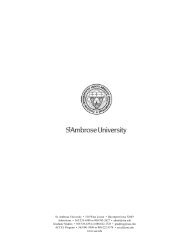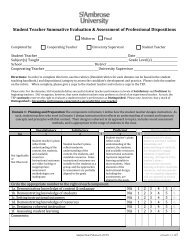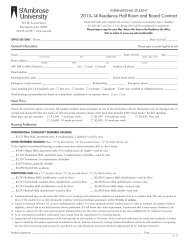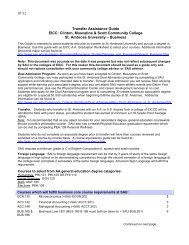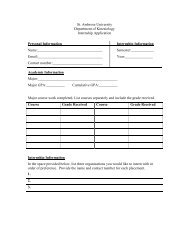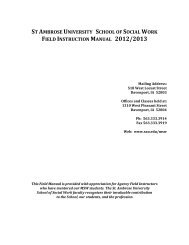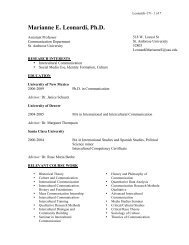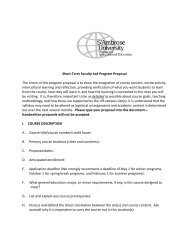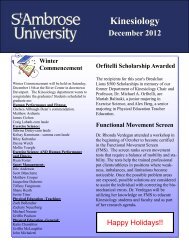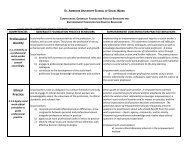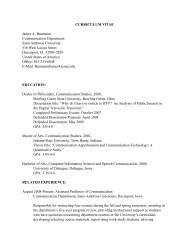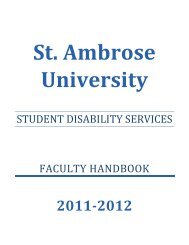St. Ambrose University 518 West Locust Davenport Iowa 52803 admit
St. Ambrose University 518 West Locust Davenport Iowa 52803 admit
St. Ambrose University 518 West Locust Davenport Iowa 52803 admit
Create successful ePaper yourself
Turn your PDF publications into a flip-book with our unique Google optimized e-Paper software.
Graduate Curricula<br />
in a specific discipline rather than take two<br />
Individual Career Needs courses. A concentration<br />
concept has been developed for this purpose.<br />
<strong>St</strong>udents electing this concentration concept<br />
will take 17 three-semester hour courses (13<br />
required courses, 4 concentration courses).<br />
Currently the four areas of concentration are:<br />
Finance, Human Resource Management,<br />
Management Information Systems, and<br />
Marketing. Concentration courses are available<br />
on the main campus in <strong>Davenport</strong>, <strong>Iowa</strong> and in<br />
the satellites if sufficient demand warrants.<br />
Course Descriptions<br />
Leveling (CPC) Courses<br />
MBA 500. Mathematics for Management<br />
and Economics<br />
3 credits<br />
Functions, graphs of elementary functions, matrices<br />
and determinants, systems of linear equations.<br />
Emphasis on applications to management, decision-making<br />
and economics. Prerequisites: May<br />
not be taken without GMAT results.<br />
MBA 506. Financial Accounting 3 credits<br />
Discussion of the generally accepted accounting<br />
principles as they relate to recording of financial<br />
transactions and the preparation, use and analysis<br />
of financial statements. Topics include an<br />
overview of the accounting cycle, income measurement,<br />
financial reporting, cash flow statement,<br />
and financial statement analysis.<br />
Prerequisites: None. MBA 506 can be waived if<br />
the student has an undergraduate or graduate<br />
degree in accounting; or has successfully completed<br />
at least 18 hours of accounting within the last<br />
five (5) years; or has a CPA or CMA certificate.<br />
MBA 507. Managerial Accounting 3 credits<br />
Discussion of methods for analyzing and reporting<br />
accounting information for planning, controlling,<br />
and decision making. Topics include product<br />
costing, budgets, performance measurement,<br />
quality costs and international operations.<br />
Prerequisites: 506 or permission of instructor.<br />
MBA 507 can be waived if the student has an<br />
undergraduate or graduate degree in accounting;<br />
or has successfully completed at least 18 hours of<br />
accounting within the last five (5) years; or has a<br />
CPA or CMA certificate.<br />
MBA 526. Macroeconomics Analysis for<br />
Business<br />
3 credits<br />
This course provides for a review of introductory<br />
economics. Topics include the production possibilities<br />
curve (transformation curve), market supply<br />
and, circular flow, and the production function<br />
(Law of Diminishing Returns). An analysis<br />
of the nation’s economy and its impact on business,<br />
employment/unemployment, price levels,<br />
consumption, investment, interest rates, business<br />
cycles, forecasting, general growth theory, government<br />
policy and international business.<br />
Prerequisites: None.<br />
Core Courses<br />
MBA 505. <strong>St</strong>atistical Methods for Decision-<br />
Making<br />
3 credits<br />
Basic statistical techniques for decision-making:<br />
frequency distribution, descriptive measures,<br />
probability, sampling, estimation, tests of<br />
hypotheses, regression and correlation analysis.<br />
Prerequisites: May NOT be taken without 35%<br />
on quantitative portion of GMAT or MBA 500,<br />
if required.<br />
MBA 621. Organizational Theory, Behavior and<br />
Communication<br />
3 credits<br />
<strong>St</strong>udy of the organization (for profit and nonprofit)<br />
as a complex system: line and staff functions,<br />
administration/leadership styles, motivation<br />
and group dynamics – and impact of each on the<br />
achievement of organization goals. Special<br />
emphasis on organization communication.<br />
Prerequisites: None.<br />
MBA 626. Managerial Economics 3 credits<br />
Application of economic principles to management<br />
decision-making: decision theory, demand<br />
theory/sales forecasting, linear programming,<br />
173



